
Horry County Schools counselor promotes race-based event for students; school district promotes organizations that push for educators to teach “social justice” and “LGBTQ” issues in classrooms
Incidents
A concerned community member sent an email to Parents Defending Education that a counselor from Conway High School had forwarded to parents. The email promoted a specifically “Latinx Student Summit” at the Coastal Carolina University for April 28, 2022. The email outright states that “the goal is to recruit local Latinx high schools students to this event.” Coastal Carolina University’s program manager of the Office of Diversity and Inclusion appeared to have sent the email to the school.
The university’s program manager’s email signature includes the pronouns “she/her/hers” and includes a link labeled “what is this?” The link goes to a webpage that asks: “What are personal pronouns and why do they matter?” The webpage states:
Often, people make assumptions about the gender of another person based on the person’s appearance or name. These assumptions aren’t always correct, and the act of making an assumption (even if correct) sends a potentially harmful message — that people have to look a certain way to demonstrate the gender that they are or are not.

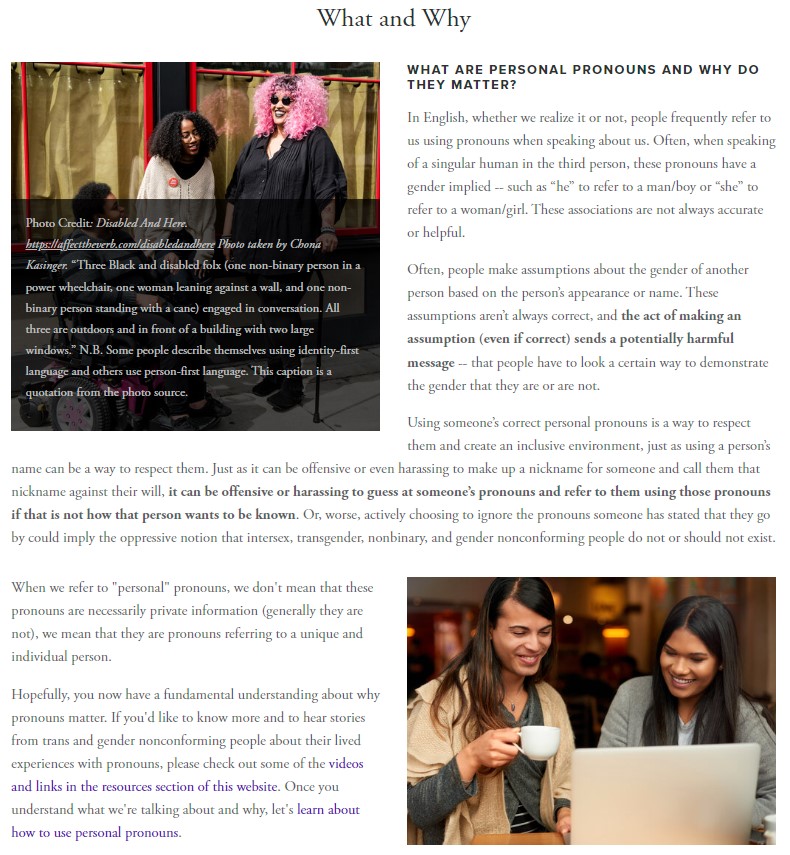
Conway High School’s district – Horry County Schools – has a page on its website called “Family Resources” that has a section labeled “Resources for Diversity, Equity, and Inclusion.” One resource listed in this section is titled “Speaking Up Against Racism Around the New Coronavirus.” The resource is from the organization Learning for Justice. The organization states in the resource that “educators have a responsibility to interrupt any anti-AAPI and xenophobic narratives.”
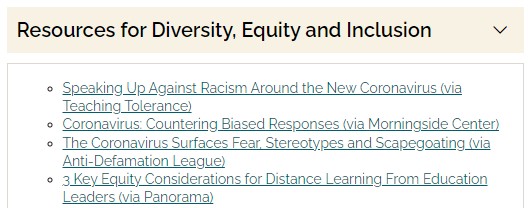
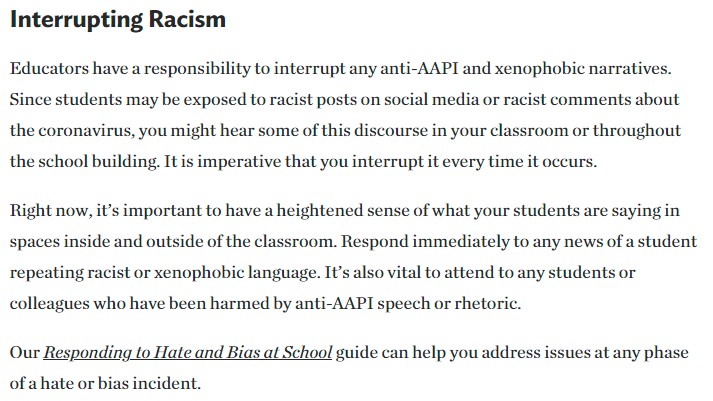
Learning for Justice is an organization known for pushing its “Social Justice Standards” to be adopted in schools throughout the country. The document for these standards includes goals for students. One goal is that “students will develop language and historical and cultural knowledge that affirm and accurately describe their membership in multiple identity groups.” Another goal appears to outright state that the purpose of the “Social Justice Standards” is to turn students into political activists: “Students will make principled decisions about when and how to take a stand against bias and injustice in their everyday lives and will do so despite negative peer or group pressure.”
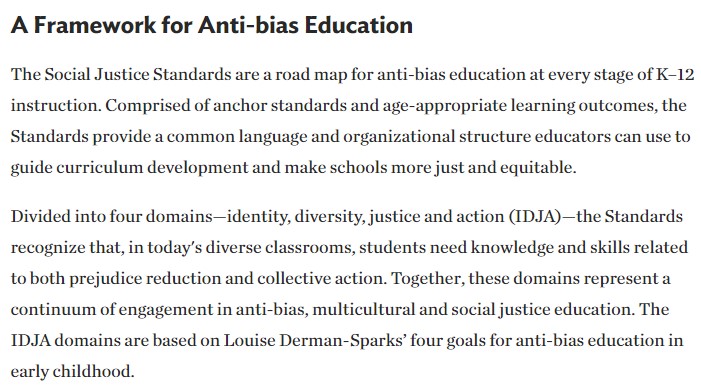
The school district also promotes an equity resource titled “The Coronavirus Surfaces Fear, Stereotypes, and Scapegoating” from the Anti-Defamation League (ADL). This ADL page discusses COVID-19 and explains that “contagious diseases often fuel scapegoating and anti-immigrant and other forms of bias and racism.” The ADL is a known political organization that supports and advocates for left-wing causes. The organization has pushed its “No Place for Hate” project in America’s schools.

In a document for the “No Place for Hate” project, the ADL states that “although learning how to demonstrate kindness is an important part of a child’s psychological and social development, ADL highly encourages schools to move beyond kindness to social justice.” One section of the document is titled “Let’s Get It Right: Using Correct Pronouns and Names.” In this section, the document encourages teachers to use the preferred pronouns of students:
From an early age, many were taught that pronouns should follow specific rules along the gender binary: ‘she, her and hers’ for girls and women and ‘he, him and his’ for boys and men. However, as our society has progressed in understanding gender identity, our language must also be updated. It should be accurate and convey understanding and respect for all people, especially for those who are transgender, gender non-conforming and non-binary.
The ADL’s document then encourages teachers to implement “LGBTQ” topics into classroom discussions:
Using the lesson below, lead a discussion about the ways in which LGBTQ people, events and issues have been less visible or made invisible in mainstream accounts of history. Explore the impact of invisibility on people and how different groups have been historically marginalized in society. Then, engage students in a discussion about people who may feel invisible in their school. Be sure to focus on general identity characteristics (e.g., sexual orientation, immigration status, gender identity, etc.) rather than specific individuals. Based on this discussion, ask students to sign up to be interviewed if they feel like an aspect of their identity needs more visibility.
The “No Place for Hate” document also features a “Pyramid of Hate.” The ADL uses the document to explain that “while every biased attitude or act does not lead to genocide, each genocide has been built on the acceptance of attitudes and actions described at the lower levels of the Pyramid.” The pyramid intends to show that actions such as using “non-inclusive language” and committing “microaggressions” will possibly lead to “the act or intent to deliberately and systematically annihilate an entire people.”
Another equity resource the school district promotes is titled “3 Key Equity Considerations for Distance Learning From Education Leaders” from Panorama Education Inc. The organization is known for helping schools throughout the country survey the race, ethnicity, sexual orientation, and gender identity of students in an effort to push “equity and inclusion” in school systems. The organization offers an “Equity and Inclusion Survey” to “help schools and districts track the progress of equity initiatives through the lens of students and staff, identify areas for celebration and improvement, inform professional development, and signal the importance of equity and inclusion to the community.”
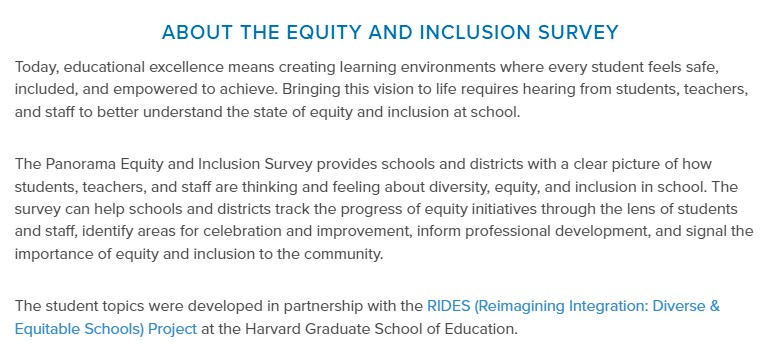
The school district also promotes a resource from CASEL labeled “SEL and COVID-19.” The resource is a document from CASEL urging school districts to adopt Social Emotional Learning (SEL) into their curricula. In regard to COVID-19, CASEL states in the document: “Use developmentally-appropriate conversations and lessons to discuss the impact, history, and context around biased or stigmatizing comments and behaviors related to the disease. See examples of how to have conversations about racism, stereotyping, and bias related to the virus.” CASEL links to the organizations Learning for Justice and the ADL in the statement.
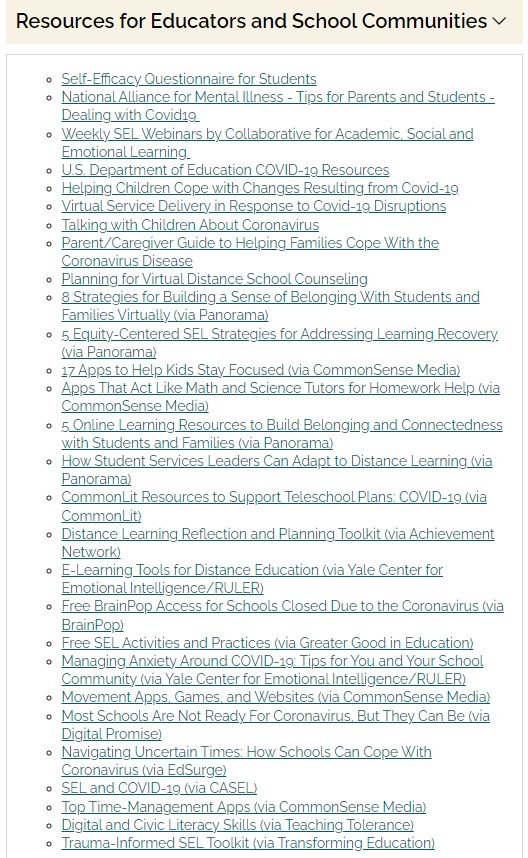
CASEL is an organization that works with school districts throughout the country to use SEL in an effort to push “equity” and “social justice” in education. On July 1, 2020, CASEL promoted “racial justice” in discussing its roadmap for reopening schools during the COVID-19 pandemic. In explaining the importance of the reopening process for schools, the organization stated that “this moment called on all members of our school communities to deepen our social and emotional competencies and create equitable learning environments where all students and adults process, heal, and thrive.” CASEL also published a video in 2020 titled “SEL As a Lever for Equity and Social Justice.”
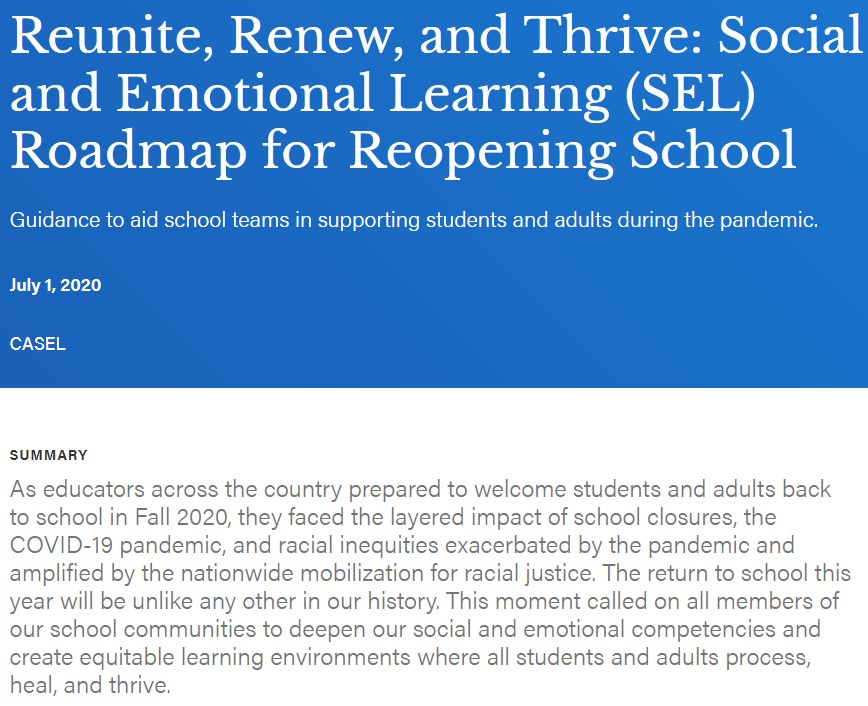
Stay Informed
